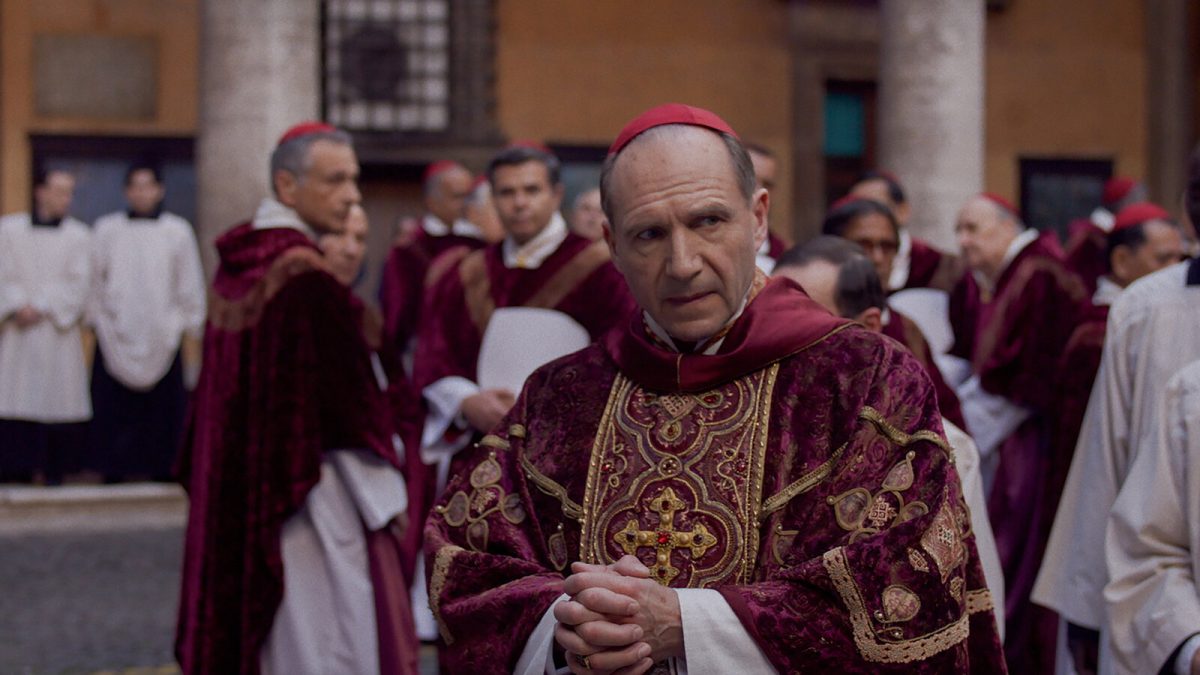“Conclave,” a thriller/mystery film, had its U.S. theatrical release on Oct. 25, 2024. Edward Berger directed the film. “All Quiet on the Western Front” was Berger’s most notable credit thus far, picking up four Academy Awards in 2022.
“Conclave” follows the highly-secure Catholic “papal conclave” process, during which the College of Cardinals, senior members of the Catholic church, gather to elect a new pope, a process with a deep history dating back to 1276. Conclaves are done in near-total secrecy, kept solely within the select group of eligible cardinals. Therefore, the viewer has uncertain expectations as we watch our protagonist, Cardinal Dean Thomas Lawrence, played by Ralph Fiennes, attempt to organize an effective conclave. He subsequently uncovers controversial secrets regarding the church’s candidates.
“Conclave” avoids the historical fiction category with its 21st-century setting during an undisclosed year. It combines the aged visuals of the Sistine Chapel with modernity. For example, a character known as Cardinal Tedesco, an Italian traditionalist played by Sergio Castellito, takes a puff of his vape during high-intensity moments. The cardinals are seen using touch-screen cell phones, elegantly subverting the viewer’s subconscious predispositions for how a candidate for pope carries themselves. This “blending of Vatican grandeur with mundane modernity” was a purposeful choice made by production designer Suzie Davies. Davies also tweaked the seats of the cardinals’ voting room to face each other, creating a confrontational, politically charged environment. Her previous credits include 2023 film “Saltburn.” However, she departs from its messy, party-like aesthetic to create the muted grandeur of “Conclave.”
The film’s photography also reflects the secretive nature of the conclave process via technical processes. It visually translates the film’s smothering atmosphere by shutting out natural light in its interior shots, which feature long, twisting hallways. Stéphane Fontaine, the cinematographer for “Conclave,” said that she attempted to either isolate characters or pack frames to “translate the sense of unease.” Generally, “Conclave” is full of direct contradictions that collaborate to create beautifully constructed ideas. Fontaine describes the script as “both intimate and epic,” which drew her to the project, and its cinematography reflects that dispute between themes in a manner that becomes cohesive.
Despite a few instances of short, sudden moments of physical action, the plot of “Conclave” is largely character-driven, powered not by somatic movement but by the verbal interactions between Cardinal Lawrence and the other candidates for pope. Luckily, its dialogue is not too difficult to follow and understand, as it is set in the modern day and usually utilizes current language. However, some basic knowledge of Catholic traditions and titles may benefit the viewer, especially upon their first watch.
The distinct varying viewpoints of the cardinals reflect the current politicized state of the Catholic Church internationally. Cardinal Bellini, played by Stanley Tucci, is an American competitor for the role of pope who characterizes himself as a liberal. Cardinals Adeyemi (Lucian Msamati), Tremblay (John Lithgow) and Tedesco (Castellitto) label themselves as traditionalist or conservative in their views. Cardinal Tedesco delivers a racist monologue to Cardinal Lawrence, and Cardinal Adeyemi holds homophobic beliefs — yet support from the voters remains unwavering despite these opinions. As a result, the film has received backlash from many facets of the Catholic church. The church is nearly evenly split on every key issue, and therefore on whom to support. Cardinal Lawrence must attempt to hide this division from the general public, which becomes increasingly difficult when they repeatedly fail to reach a majority agreement.
Despite the fascinating intricacies of “Conclave’s” screenplay, it would not be able to come alive on screen if it were not for the undeniable talent of its actors. Ralph Fiennes appears unbothered as Cardinal Lawrence until he begins to unravel under the stressors of scandal, a pattern that repeats in many of the characters throughout the film. During what could be his stand-out scene in the film, Lucian Msamati as Cardinal Adeyemi breaks into pathetic sobs in the arms of Cardinal Lawrence after a scandal involving an illegitimate child. Additionally, Isabella Rossellini appears as Sister Agnes, delivering a few impactful lines of dialogue despite her limited time on screen. The actors balance their characters’ desires for power and reputation with their fears and vulnerabilities, representing their morality — or lack thereof.
All in all, “Conclave” is a film that is both entertaining and impactful, as well as incredibly unique in its execution. Many critics expect it to receive a variety of Oscar nominations this season. Whether you watch for the characters, the cinematography or the political commentary, you will not leave feeling disappointed.


